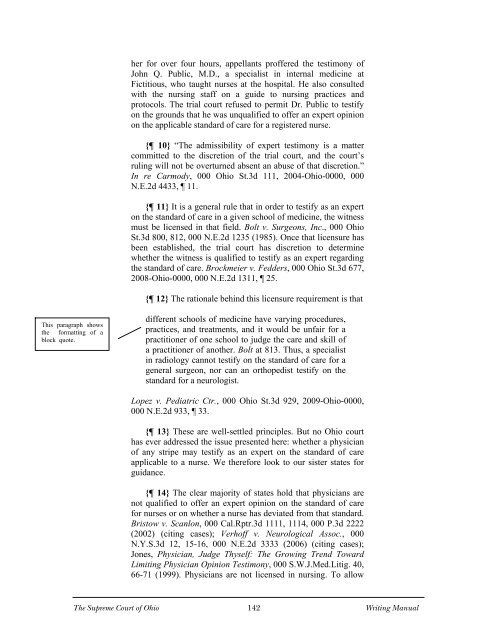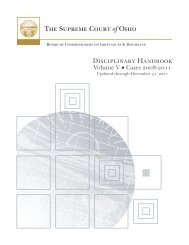WRITING MANUAL - Supreme Court - State of Ohio
WRITING MANUAL - Supreme Court - State of Ohio
WRITING MANUAL - Supreme Court - State of Ohio
Create successful ePaper yourself
Turn your PDF publications into a flip-book with our unique Google optimized e-Paper software.
her for over four hours, appellants pr<strong>of</strong>fered the testimony <strong>of</strong><br />
John Q. Public, M.D., a specialist in internal medicine at<br />
Fictitious, who taught nurses at the hospital. He also consulted<br />
with the nursing staff on a guide to nursing practices and<br />
protocols. The trial court refused to permit Dr. Public to testify<br />
on the grounds that he was unqualified to <strong>of</strong>fer an expert opinion<br />
on the applicable standard <strong>of</strong> care for a registered nurse.<br />
{ 10} “The admissibility <strong>of</strong> expert testimony is a matter<br />
committed to the discretion <strong>of</strong> the trial court, and the court’s<br />
ruling will not be overturned absent an abuse <strong>of</strong> that discretion.”<br />
In re Carmody, 000 <strong>Ohio</strong> St.3d 111, 2004-<strong>Ohio</strong>-0000, 000<br />
N.E.2d 4433, 11.<br />
{ 11} It is a general rule that in order to testify as an expert<br />
on the standard <strong>of</strong> care in a given school <strong>of</strong> medicine, the witness<br />
must be licensed in that field. Bolt v. Surgeons, Inc., 000 <strong>Ohio</strong><br />
St.3d 800, 812, 000 N.E.2d 1235 (1985). Once that licensure has<br />
been established, the trial court has discretion to determine<br />
whether the witness is qualified to testify as an expert regarding<br />
the standard <strong>of</strong> care. Brockmeier v. Fedders, 000 <strong>Ohio</strong> St.3d 677,<br />
2008-<strong>Ohio</strong>-0000, 000 N.E.2d 1311, 25.<br />
{ 12} The rationale behind this licensure requirement is that<br />
This paragraph shows<br />
the formatting <strong>of</strong> a<br />
block quote.<br />
different schools <strong>of</strong> medicine have varying procedures,<br />
practices, and treatments, and it would be unfair for a<br />
practitioner <strong>of</strong> one school to judge the care and skill <strong>of</strong><br />
a practitioner <strong>of</strong> another. Bolt at 813. Thus, a specialist<br />
in radiology cannot testify on the standard <strong>of</strong> care for a<br />
general surgeon, nor can an orthopedist testify on the<br />
standard for a neurologist.<br />
Lopez v. Pediatric Ctr., 000 <strong>Ohio</strong> St.3d 929, 2009-<strong>Ohio</strong>-0000,<br />
000 N.E.2d 933, 33.<br />
{ 13} These are well-settled principles. But no <strong>Ohio</strong> court<br />
has ever addressed the issue presented here: whether a physician<br />
<strong>of</strong> any stripe may testify as an expert on the standard <strong>of</strong> care<br />
applicable to a nurse. We therefore look to our sister states for<br />
guidance.<br />
{ 14} The clear majority <strong>of</strong> states hold that physicians are<br />
not qualified to <strong>of</strong>fer an expert opinion on the standard <strong>of</strong> care<br />
for nurses or on whether a nurse has deviated from that standard.<br />
Bristow v. Scanlon, 000 Cal.Rptr.3d 1111, 1114, 000 P.3d 2222<br />
(2002) (citing cases); Verh<strong>of</strong>f v. Neurological Assoc., 000<br />
N.Y.S.3d 12, 15-16, 000 N.E.2d 3333 (2006) (citing cases);<br />
Jones, Physician, Judge Thyself: The Growing Trend Toward<br />
Limiting Physician Opinion Testimony, 000 S.W.J.Med.Litig. 40,<br />
66-71 (1999). Physicians are not licensed in nursing. To allow<br />
The <strong>Supreme</strong> <strong>Court</strong> <strong>of</strong> <strong>Ohio</strong> 142 Writing Manual
















